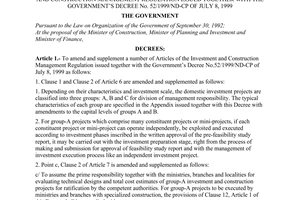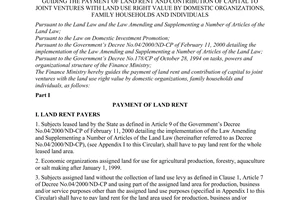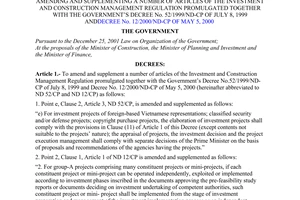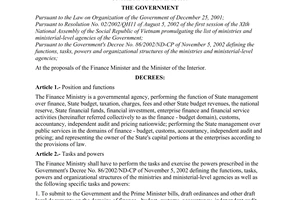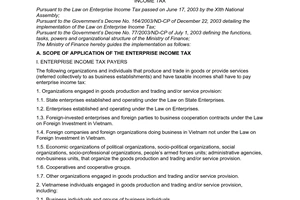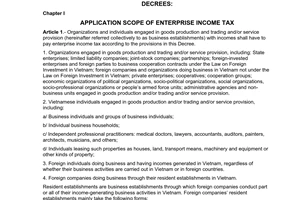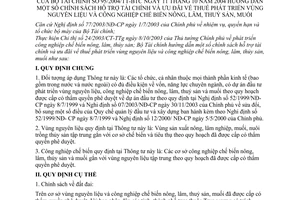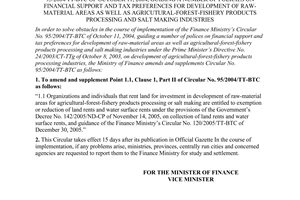Nội dung toàn văn Circular No. 95/2004/TT-BTC of October 11, 2004, guiding a number of policies on financial support and tax preferences for development of raw-material areas as well as agricultural-forest-fishery product processing and salt making industries
|
THE
MINISTRY OF FINANCE |
OF VIET |
|
No. 95/2004/TT-BTC |
, October 11, 2004 |
CIRCULAR
GUIDING A NUMBER OF POLICIES ON FINANCIAL SUPPORT AND TAX PREFERENCES FOR DEVELOPMENT OF RAW-MATERIAL AREAS AS WELL AS AGRICULTURAL-FOREST-FISHERY PRODUCT PROCESSING AND SALT MAKING INDUSTRIES
Pursuant to the Government’s
Decree No. 77/2003/ND-CP of July 1, 2003 on the tasks, powers and
organizational apparatus of the Ministry of Finance;
In furtherance of the Prime Minister’s Directive No. 24/2003/CT-TTg of October
8, 2003 on development of agricultural-forestry-fishery product processing
industries, the Finance Ministry hereby guides a number of policies on financial
support and tax preferences for development of raw-material areas as well as
agricultural-forestry-fishery product processing and salt making industries as
follows:
I. GENERAL PROVISIONS
1. Subject to the application of this Circular are organizations and individuals of all economic sectors (both domestic and foreign) that fully meet the conditions on capital, professional capabilities, and have investment projects on development of raw-material areas as well as agricultural-forest-fishery product processing and salt making industries under the plannings on investment projects approved by competent authorities as prescribed in the Government’s Decree No. 52/1999/ND-CP of July 8, 1999 and Decree No. 07/2003/ND-CP of November 30, 2003 amending and supplementing a number of articles of the Investment and Construction Management Regulation, promulgated together with the Government’s Decree No. 52/1999/ND-CP of July 8, 1999 and Decree No. 12/2000/ND-CP of May 5, 2000.
2. Raw-material areas prescribed in this Circular include concentrated areas for agricultural and forestry production, salt making and aquaculture in association with processing and consumption establishments under the plannings approved by competent authorities.
3. Processing industries prescribed in in association with concentrated raw-material areas under the plannings approved by competent authorities.
II. SPECIFIC PROVISIONS
1. Land policies:
On the basis of raw-material areas and agricultural-forestry-fishery product processing and salt making industries already approved by competent authorities, the provincial/municipal People’s Committees shall have to direct their professional agencies to create favorable conditions for organizations and individuals of all economic sectors to lease land or perform contracts with farmers for investment in the development of raw-material areas; or lease land for the building of agricultural-forest-fishery product processing or salt making industrial establishments under the projects approved by competent authorities.
1.1. Organizations and individuals that lease land for investment in the development of raw-material areas and agricultural-forest-fishery product processing or salt making industries shall be entitled to exemption or reduction of agricultural land-use tax according to the provisions of Circular No. 112/2003/TT-BTC of November 19, 2003 guiding the exemption and reduction of agricultural land use tax between 2003 and 2010, as prescribed in the Government’s Decree No. 129/2003/ND-CP of November 3, 2003 which details the implementation of the National Assembly’s Resolution No. 15/2003/QH11 of June 17, 2003 on exemption and reduction of agricultural land-use tax.
1.2. Establishments processing, selling and/or exporting agricultural-forestry-fishery products and salt, which have land demands for construction of goods processing plants, warehouses and yards, preservation and transportation establishments, shall enjoy the lowest land-rents according to current law provisions.
1.3. In cases where enterprises’ agricultural-forestry-fishery product- and salt-processing, -selling or -exporting establishments are located in cities or towns, when such establishments are removed out of cities or towns under plannings, the enterprises shall be exempt from land rents for three years after the completion of construction of production establishments in new places, or enjoy preferences on land-rent exemption or reduction prescribed in the Finance Ministry’s Circular No. 35/2001/TT-BTC of May 25, 2001 guiding the payment of land rents and contribution of joint-venture capital with the land-use right value by domestic organizations, households and individuals (if any).
rents collected from land-lease contracts of agricultural-forestry-fishery product- and salt-processing, -selling or -exporting establishments constitute local budgets’ revenues according to the provisions of the State Budget Law (amended). Annually, the provinces and centrally-run cities shall have to prioritize and allocate capital to investment in infrastructure of localities where exist the raw-material areas and agricultural-forestry-fishery product- and salt-processing, -selling or -exporting establishments.
2. Investment policies:
2.1. Infrastructure projects such as traffic road, irrigation, canal, sewerage, aquaculture infrastructure, electric lines, system of wholesale markets, supplies and agricultural-forestry-fishery commodity trading centers, preservation warehouses located in concentrated raw-material areas in association with agricultural-forestry-fishery product- and salt-processing and -selling establishments shall be supported partly by the State with the concentrated capital construction capital according to the provisions of the State Budget Law (amended). The levels of local budget support shall be decided by the provincial/municipal People’s Committees to suit each region and locality, depending on the budgets’ capabilities, which, however, must not exceed 60% of projects’ total investment capital.
2.2. Projects on planting concentrated paper, paper pulp and artificial board raw-material forests in association with processing enterprises, projects on producing prototype and new varieties using high technologies in service of development of raw-material areas, investment projects on industrial-salt production and processing shall enjoy the State’s development investment credit policies according to current regulations.
3. Policies in support of transfer of technical and technological advances:
- Projects on development of raw-material areas and agricultural-forestry-fishery product processing and salt making industries, after being approved by competent authorities, shall enjoy the State budget’s funding support for:
+ Import and rapid application of new varieties, upgrading, renovation or building of establishments breeding, producing and supplying varieties for development of raw-material areas.
+ Spending on such activities as hire of experts, purchase of designs, purchase of technologies,
+ Spending on agricultural and fishery promotion.
- Basing itself on the specific conditions of each branch and the efficiency of projects on transfer of new techniques and technologies, the Finance Ministry shall coordinate with the Ministry of Agriculture and Rural Development and the Ministry of Fisheries in deciding to provide support for enterprises set up under decisions of the Government, the ministries and central branches. The support sources shall be included in the central budget’s annual plan.
The provincial/municipal People’s Committees shall decide to provide support for enterprises set up by localities. The support sources shall be included in local budgets’ annual plans.
4. Export and trade promotion support:
Enterprises which process agricultural-forestry-fishery products and salt for export shall enjoy export and trade promotion support according to the Government’s current regulations and the Finance Ministry’s guidance (the Finance Ministry’s Circular No. 86/2002/TT-BTC of August 27, 2002 guiding the spendings in support of trade and export promotion activities).
5. Regarding tax preference policies:
Apart from tax preferences prescribed in the Domestic Investment Promotion Law, the Law on Foreign Investment in and the Government’s documents guiding the implementation thereof, organizations and individuals of all economic sectors that have projects on development of raw-material areas and agricultural-forestry-fishery product processing and salt making industries shall enjoy the following preferences:
5.1. Regarding import tax:
Import tax shall be exempt for machinery, equipment and special-use transport means included in imports-processing technological chains for formation of fixed assets, which cannot be produced at home yet.
5.2. Regarding enterprise income tax:
Agricultural-forestry-fishery product processing and salt making industrial establishments in the operation branches and trades, domains, geographical areas, which have investment projects on building new production chains, expanding production scales, renewing technologies, improving the ecological environment or raising production capacity as prescribed in the Government’s Decree No. 164/2003/ND-CP of December 22, 2003 detailing the implementation of the Enterprise Income Tax Law, shall enjoy enterprise income tax preferences, tax exemption or reduction for the incomes increased as a result of such investment under the Finance Ministry’s guidance (the Finance Ministry’s Circular No. 128/2003/TT-BTC of December 22, 2003 guiding the implementation of Decree No. 164/2003/ND-CP of December 22, 2003). In cases where they enjoy different tax preference levels, the maximum preference level shall apply.
III. IMPLEMENTATION ORGANIZATION
This Circular takes effect 15 days after its publication in the Official Gazette. In the course of implementation, if any difficulties or problems arise, organizations, individuals, provinces and centrally-run cities are requested to report them to the Finance Ministry for settlement.
|
|
FOR THE FINANCE
MINISTER |

